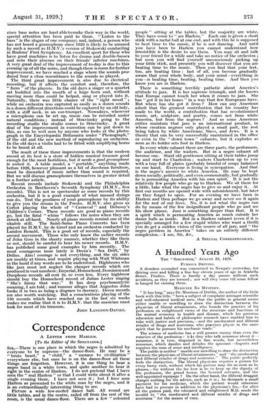Correspondence
A LETTER FROM HARLEM. To the Editor of the SPECTATOR.] Sta,—There is one place in which the negro is admitted by everyone to be supreme—the dance-floor. He may be a "brute beast," a child," a "menace to civilization" everywhere else, but once he is on the dance-floor all these things are forgotten. However, it is one thing to hear a negro band in a white town, and quite another to hear it right in the centre of Harlem. I do not pretend that I have seen the "real Harlem" or that I could write about it after a single evening there. I have not seen it ; but I have seen Harlem as presented to the white man by the negro, and it is an extraordinarily interesting thing to see.
Picture a wide low-roofed dance hall. All round are little tables, and in the centre, railed off from the rest of the room, is the usual dance-floor. There are a few "coloured
people" sitting at the tables, but the majority are white. They have come to "see Harlem." Each one is given a short stick with a metal ball at one end, and with this he is supposed to beat time to the music, if he is not dancing. And until you have been to Harlem you cannot understand how irresistible is the desire to use them. You may sit and talk to your friend for a while and take no notice of the orchestra ; but soon you will find yourself unconsciously picking up your little stick, and presently you will discover that you are beating time to the music. Then you find that your feet, too, are beating time ; last of all, you become gradually aware that your whole body, and your mind—everything in you—is beating time, beating, beating time. And then you know you are in Harlem.
There is something terribly pathetic about America's attitude to jazz. It is her supreme triumph, and she knows that Europe cannot touch her when it comes to jazz. She has "got it in her bones" in a way that few Europeans have. But where has she got it from ? How can any. American admit that the greatest contribution that his country has made to the world, a contribution that has revolutionized music, art, sculpture, and poetry, comes not from white America, but from the negroes ? And so some American critics maintain that jazz is an international product, in- whose creation negroes only played a small part, the rest being taken by white Americans, Slays, and Jews. It is a theory that can be very successfully maintained in the office or even in the "down town" cabarets, but it explodes as soon as its holder sets foot in Harlem.
In every white cabaret there are three parts, the performers, the audience, and the waiters. But in a negro cabaret all become one. Staid old gentlemen sitting at their tables jump up and start to Charleston ; waiters Charleston up to you- with a tray full of plates (probably brimful of soup) balanced on one hand. Everyone is living in syncopation. And that is the negro's answer to white America. He may be kept down socially, politically, and even economically, but gradually he is permeating America with his own spirit. It is not the relatively few people who go up to Harlem. We sit there for a little, take what the negro has to give us and enjoy it. At first our mouths are opened wide with astonishment, but later on they forget to open. For an evening we have been in Harlem and then perhaps we go away and never see it again for the rest of our lives. No, it is not what the negro can do by means of the few insignificant people who go and see his show places. Jazz is something deeper than that. It is a spirit which is permeating America as much outside her dance halls as inside. But in a Harlem cabaret (even if it is specially arranged for a few stupid whites who want a thrill) you do get a sudden vision of the source of all jazz, and "the negro problem in America" takes on an entirely different complexion.—I am, Sir, &c.,
A SPECIAL CORRESPONDENT.
































 Previous page
Previous page